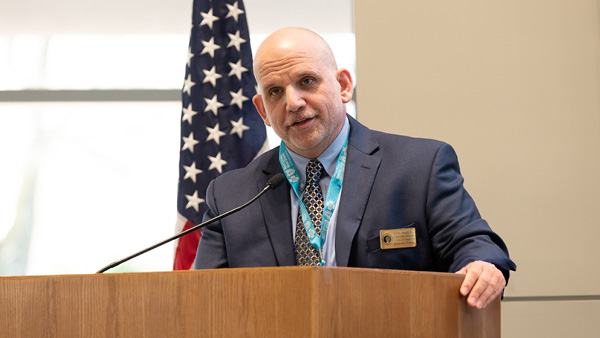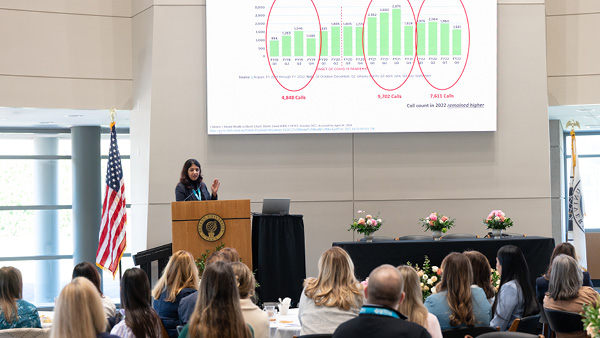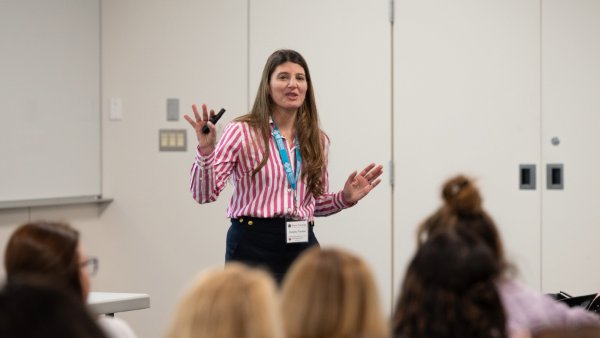On April 26, pediatricians, psychologists, health administrators, and other healthcare professionals gathered at Bryant University for the second-annual Healthcare Summit. Bringing together members across sectors to listen, collaborate, and talk about problems within their specific fields, the day-long event seeks to address persistent issues and foster innovative solutions.
“This year, our focus is on behavioral health and the challenges we face in this area, particularly in adolescence. This is a subset of the population in which we are seeing rising rates of depression and anxiety,” said School of Health and Behavioral Sciences Director Kirsten Hokeness, Ph.D., who organized this year's summit alongside Joseph Trunzo, Ph.D., associate director of the School of Health and Behavioral Sciences and professor of Psychology.
Delivering the opening remarks, Sarah Fleury — managing director of behavioral health at Blue Cross & Blue Shield of Rhode Island — shared that one in five children between ages 13 and 18 live with, or have had, a mental illness diagnosis.
“By coming together to share our knowledge, experiences, and ideas, we can work toward finding solutions to these complex issues,” said Fleury.

Bryant University President Ross Gittell, Ph.D., shared that according to a Healthy Minds Study — which collects data from 373 campuses nationwide — more than 60 percent of college students met the criteria for at least one mental health problem during the 2020-2021 academic year.
“By working together, harnessing our collective expertise, and leveraging each other’s resources, we can pave the way for a healthier and more promising future for Rhode Island's youth. In doing so, we are also creating a more promising future for the entire state and region,” said Gittell.
At the ready with potential solutions, Tanuja Gandhi, MD — the summit’s first keynote speaker — dove into the history behind the pediatric mental health crisis. She noted that the crisis has been brewing for a while; however, the pandemic made the issue more apparent and increasingly difficult to handle.
To drive change, Gandhi suggested a broad range of ideas for healthcare workers and organizations to work toward — such as creating coordinated and seamless systems of care to help the transition from youth to adulthood; intensifying efforts to recruit and retain healthcare personnel from underrepresented backgrounds; and increasing state funding for Medicaid for evidence-based mental health screening, diagnosis, and treatment.
“We also need to get creative around what community-based care is going to look like,” said Gandhi, an adult, child, adolescent and forensic psychiatrist, who works at Bradley Hospital and teaches at Brown University.

With children and adolescents in school six hours a day, five days a week for nine months of the year, Ross Greene, Ph.D., noted that the youth behavioral health crisis needs to be addressed in schools.
Emphasizing the idea of meeting kids where they are, he said healthcare professionals in schools should try to understand and solve problems, rather than modifying concerning behaviors.
“So much of what we’re training people to do in schools is crisis management — not crisis intervention,” said Greene. He suggested that healthcare professionals take advantage of the Assessment of Lagging Skills and Unsolved Problems (ALSUP) guide, which Greene describes as “assessment gold,” since the information helps individuals address issues early and engage in crisis intervention.
Delivering the afternoon keynote, Daisy Bassen, MD, Thrive Behavioral Health medical director, shared some of the local work her center has been doing to address the youth behavioral health crisis. She noted that Thrive is in the process of becoming a certified community behavioral health clinic, which will help to expand services, break down barriers to accessing care, integrate primary care and behavioral healthcare, and promote collaboration with other agencies. Additionally, the center established a youth council to ensure young people’s voices are heard in the behavioral health discussion.

The summit also included a series of breakout sessions, including one led by Christina Tortolani, Ph.D., who will join Bryant this summer to lead the university's new clinical psychology doctoral program, which will help to alleviate the shortage of behavioral health professionals in the Ocean State.
In her interactive, discussion-based session, attendees partnered up and shared what inspired them to work in behavioral health and discussed the challenges they see in their areas of expertise. Tortolani also explored ways to build a robust and resilient behavioral health workforce.
“Fifty percent of behavioral health providers are experiencing symptoms of burnout,” said Tortolani. “We need to reframe what it means to take care of others by taking care of ourselves.”